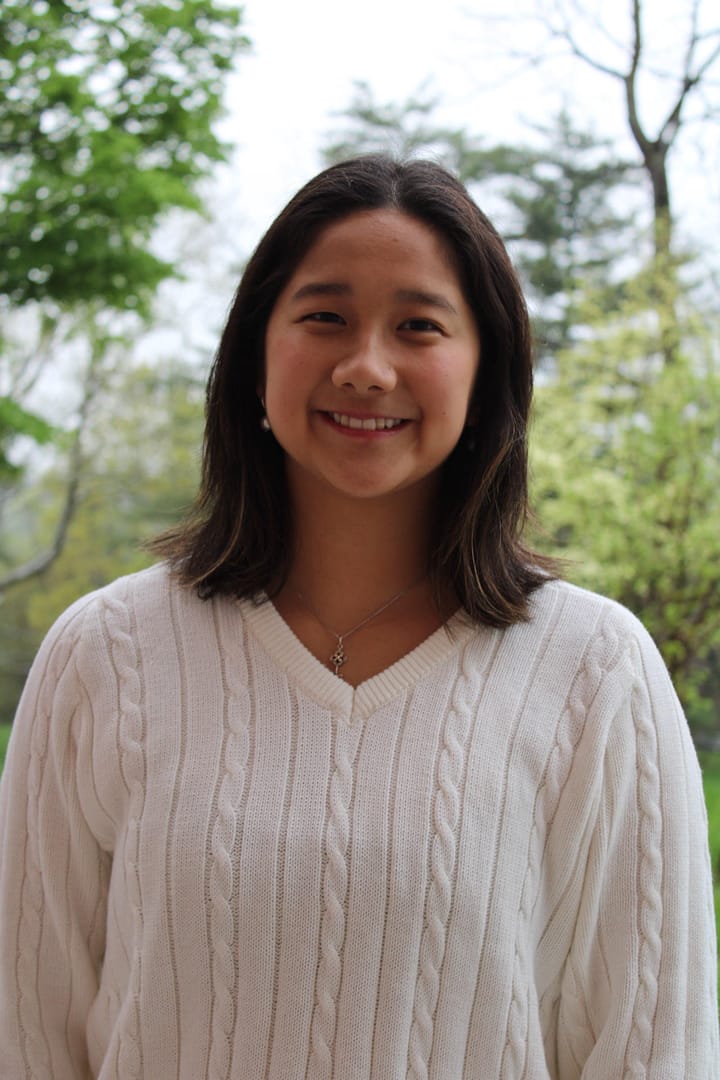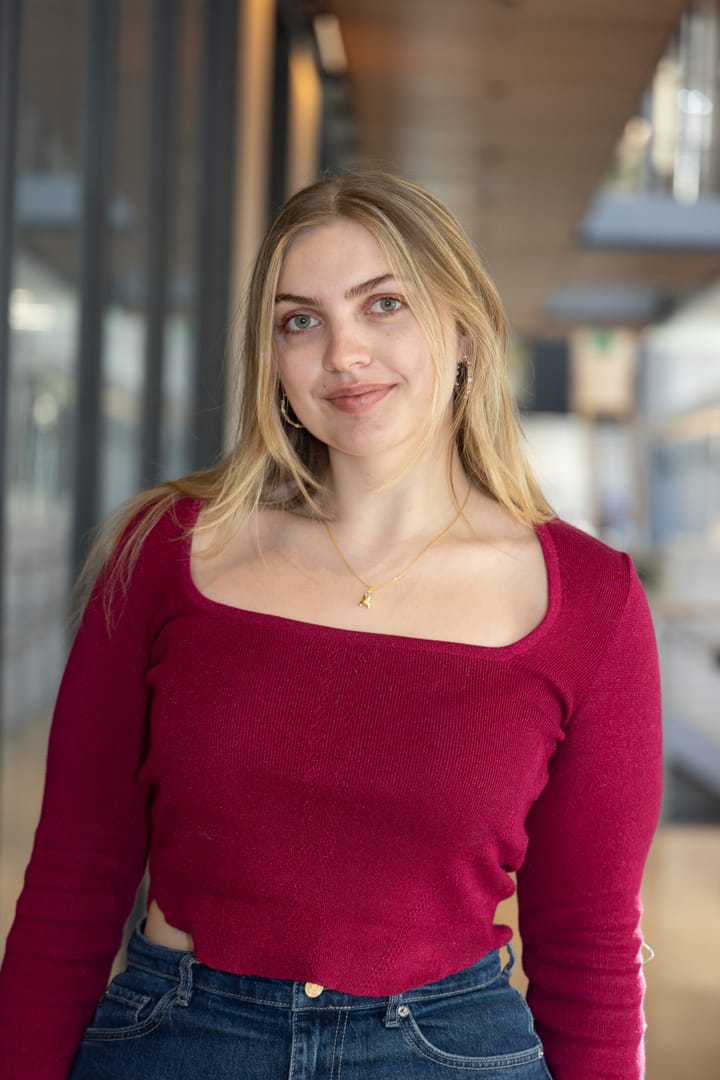Exit Letter: There is No Precedent
Editor-in-Chief Michael Mason ’25 reflects on the unusual nature of his leadership tenure — defying precedent while embracing the chaos, camaraderie, and contradictions that come with leading The Student.
Perhaps my least favorite trait — in myself and others — is vanity. This is, at times, unhealthy. I sometimes hesitate to speak my mind or express myself out of fear that, by putting forth my own voice, I’m suggesting that I think I have something worth saying. Who am I to think that I could possibly have an original, worthwhile thought?
In a newspaper, of all places, it’s especially important that everything we publish adds something to the conversation. But as I look back through the exit letters of yonder years, I wonder if it’s all already been said. Like Lynn Lee ’23, “The image of a tight-knit group of students all investing themselves in a single project and supporting each other in the process stirred something in me,” and compelled me to join The Student. Despite the long nights and time-consuming edits, like Sam Spratford ’24, “I stuck around because … I grew into a love for journalism that I didn’t even know I had.” If you visit the newsroom today, you’ll still find “[c]ollege kids hunch[ed] over computers in a cluttered room,” even if their names and faces aren’t the same as the ones Liam Archacki ’24 wrote about a year and a half ago. Like Kei Lim ’25, “The newsroom is by far the place on campus most salient to me, with The Student having consumed more of my Amherst life than anything else.” And, as Dustin Copeland ’25 wrote about our predecessors, “I learned so much that I can’t possibly recount it all here.”
With mentors and letters like those, what can I possibly add to the sacred archives we call “exit letters”?
For a few days, I considered not even trying — refusing to write one at all. But, to quote Irving Rapper’s historic film (that I don’t actually care much for) “Now, Voyager,” “To take is sometimes a way to give.” I suppose I can take a page from this week’s edition for myself.
If you can believe it, my invocations to the past are only a fraction of those made every semester in the newsroom. The word “precedent” often reigns supreme here in a way few people outside the Supreme Court would understand. Every week, I am certain I’ve finally mastered AP style. And every week, I run into a grammatical situation so niche that no website on the internet has ever even considered it. When even the guardians of AP style, Naima Mohamed ’27 and June Dorsch ’27, can’t figure it out, we turn to precedent.
InDesign layout is weird? Check a past issue. Creating a new spreadsheet? Copy the last one. Choosing new editors-in-chief? Make sure they meet the same criteria we’ve always followed. Precedent is our permanent, unchanging God, under which all articles and editors find their style and purpose.
But as I’ve gone through the commencement profiles and exit letters of the Editors of Student Past these last few weeks, I’ve been reminded how fragile our God is. Isabel Tessier ’19 became editor-in-chief immediately after a semester abroad. During her tenure with Nate Quigley ’19, the paper switched from relying on ad revenue to using funding from the Association of Amherst Students — because it had collected $10,000 in debt. During Covid, Theo Hamilton ’23 served as an Arts & Living editor despite being on a gap year. And, as I already knew, Lynn was the sole editor-in-chief during my sophomore fall. Even my own existence as a one-semester, senior-spring, never-senior-managing-editor, one-of-three-editors-in-chief, editor-in-chief breaks four different precedents from the past three years.
I first became my high school paper’s editor-in-chief not by nomination, but by being the only person interested in keeping the program alive. My advisor, Johanna Chausow, went much further than could have been expected of her, not only advising me throughout every step of the process but also teaching the other half of our weekly lessons, paying for snacks out of her own pocket, and pushing me to be a better editor-in-chief every step of the way. But it was 2020-2021, and our school was hybrid — meaning that any meeting time we picked would only allow half of the student body to attend. By the end of the year, we had just three writers: Henry, Elizabeth, and Sam, who stayed on even as meetings went hours beyond planned.
When I graduated and left The Thunderbolt, I considered my time there a failure. I couldn’t shake the feeling that I could have — and should have — done more. After my application to become an assistant opinion editor at the Student went unanswered, I ended up spending my freshman year primarily hiding in my room and missing my ex. But when I saw that the news team was looking for assistant editors, with nothing to lose, I applied. I got the role. That summer, Lynn emailed me, asking if I would be willing to take on a full news editor role. I accepted.
For years, my Thanksgivings and Christmases were peppered with questions of whether I’d ever become editor-in-chief here. “Oh no, I could never do that,” I’d tell them. Editors-in-chief don’t pass their classes (or show up for them). Editors-in-chief don’t sleep — they stay up until 5 a.m. (or later). Editors-in-chief don’t have time other clubs or jobs (or friends). Besides, there was no chance I’d be asked — we had too many talented editors from my year.
Immediately upon joining the Student team, I was shocked by how talented the staff was. My first week, I remember being asked to “Ghost” an article. I had no clue what a “ghost” was (it’s our online publishing website). Leo Kamin ’25, Ethan Neuschwander ’25, and I were largely flying blind, with none of us having particularly extensive experience editing on the paper. That year was defined by 2 a.m. Tuesday nights. I couldn’t imagine spending any more time on the paper, or reaching the level of talent required to chop up and rearrange every article that came in.
But if you spend enough time around editors with enough talent, you’re bound to absorb some of it. I have to thank Lynn, Liam, Julia Gentin ’26, and especially Leo for making me the editor I am today. I don’t aim to pretend I’m half the editor they are, but I’m twice the editor I would’ve been without them. I still can’t edit an article without their ghosts telling me to rewrite that lede or rearrange that paragraph.
A lot of ghosts linger on. Liam, Ethan, Leo, and I singing “Yellow” at the end of every night. Connecting with Ethan’s non-city Christian upbringing. Leo’s beautiful voice serenading us all at 1 a.m. Julia’s steadfast insistence that we follow through with her edits. Read-alouds of the police log, groans at “big chungus” jokes, and debates over the curliness of apostrophes (okay, Liam — maybe they’re important).
My appointment as editor-in-chief of The Student was, in many ways, similar to that at The Thunderbolt. I never planned to be editor-in-chief here, much less the sole senior in the room most of the time. Currently, our staff is primarily composed of freshmen and sophomores — almost none of our editors had more than a year’s worth of experience going into this semester. But this time I’m not so embarrassed by my work.
As I’ve been reflecting on my time on The Student, in my ceaseless self-obsession I’ve found myself wondering how I’ll be remembered. I’ll happily take “the guy who started Goldfish and Pringles taste tests.” Maybe I’ll be “the guy who made terrible jokes” or, if I’m lucky, “that old guy.”
I’m not only literally older than everyone on the paper — I act it too. As the only remaining person who’s known the paper before Kei and Dustin, I’ve found myself becoming the last vanguard of precedent. Naima tells me I sound as if I’m dying with all of my “Remember this when I’m gone”s and “Back in the Lynn days”s.
On some level, I do strongly believe in the values of consistency and continuity. But at the same time, our editorial board completely changes every four years — no person on the team will ever know more than four years’ worth of institutional history. Every appeal to the past is far more recent than we pretend, and very likely an appeal to a “precedent” that had no precedent itself. My time on the paper did not fit “precedent” in many ways, but through those differences, it’s made its own.
For this letter, I may not have intentionally drawn from any of the editors-in-chief before my time, but I have no doubt that their influence has transformed my experience here in ways I’ll never know. With the constant cycling of editors, I know no one here will remember me within five years. Now that I’m the voyager, I can only hope that the small precedents I’ve worked on — the taste tests, the Oxford commas, the intersection dinners — mark tiny steps forward in the constantly-evolving thing we call The Student.
While they may not maintain every old tradition I tried to instill in them, I have faith that our new team will carry on the paper to greater and greater heights. One last thanks to current Senior Managing Editors Sonia Chajet Wides ’25 and Leo, who have been with me since the start of my journey. I don’t have room to name everyone, but of course Naima and June will continue their fearless leadership, alongside new Senior Managing Editors Edwyn Choi ’27 and Lauren Siegal ’27. My greatest fear while becoming editor-in-chief was dealing with an entire team of Sophomore Michaels, but in just one semester, I’ve watched every section grow far beyond my expectations. I can’t wait to watch them take their next steps, even if it’s from afar.





Comments ()